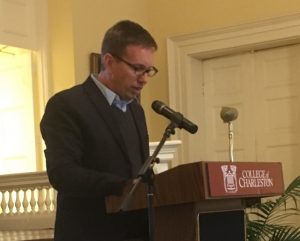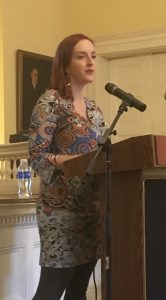
Rebecca Makkai: Searching for Truth in Reality TV
March 21, 2017 | news, readings

Chicago-based author and 2017 Pushcart Prize winner Rebecca Makkai visited The College of Charleston campus Thursday, March 16, as part of the Crazyhorse Reading Series. Her stories have appeared in Ploughshares, Harper’s, and Tin House. She was introduced by Professor and Crazyhorse Fiction Editor Anthony Varallo.
“I first became aware of Rebecca’s writing after reading her work in the Best American Short Stories—four stories in four consecutive years,” he said. “How could that be possible?—and then had the pleasure of selecting ‘The November Story’ for Crazyhorse in 2010, still one of the best stories we’ve ever published.” He went on to call it “a savvy, relentlessly entertaining satire about reality TV, the commercialization of art, the need for love, and the long odds of getting exactly what we want.” 
“The November Story” was subsequently read by Makkai on This American Life in 2011, and is included in her short story collection Music for Wartime, an assemblage of both family narrative and World War II in Hungary and contemporary settings that examine relationships in all facets.
Makkai said it felt appropriate to read “The November Story” for the Crazyhorse Reading Series. Afterward, she accepted questions from the packed audience. Charlie Baker, an MFA student at the College, noted how varying Makkai’s stories are in her collection, and asked what the most difficult story was to write.
 She answered with “The Miracle Years of Little Fork,” which she told the audience is the most different in technique from her other narrative voices. She laughed and said there have been times it’s the only example of her work someone has read, and it can color how a reader views her work overall. “It’s so different than everything else I’ve written,” she reiterated, and then went on to disclose that she enjoys playing with different forms and structures. “I get bored easily with the same thing over and over.”
She answered with “The Miracle Years of Little Fork,” which she told the audience is the most different in technique from her other narrative voices. She laughed and said there have been times it’s the only example of her work someone has read, and it can color how a reader views her work overall. “It’s so different than everything else I’ve written,” she reiterated, and then went on to disclose that she enjoys playing with different forms and structures. “I get bored easily with the same thing over and over.”
Another question drove at how she approaches the descriptions of musical and visual arts through written word, and one asked about the publication of fictionalized family narratives that look at the role and effects of WWII within her own family. To each inquiry, Makkai listened intently before nodding to begin answering the questions.
As Anthony Varallo said in his introduction, “Her stories do not say that art redeems us, necessarily, but they do suggest that the making of art—the sheer work of it, the process—might be redemption enough.”

